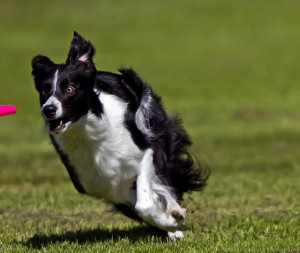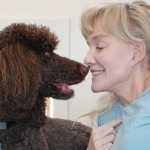Greetings dog fans!
The last few weeks have zoomed by at Border Collie breakneck speed, brimming with stuff that separated me from my laptop and (sigh) blogging.
Dr. Ian Dunbar’s newly minted seminar, Science-Based Dog Training (with Feeling), which I had the good fortune of attending in Denver on March 4, 5, 6, happily reunited me with my computer. I furiously took notes every moment of the entire workshop.
Full Disclosure: I accepted an invitation to attend the workshop free-of-charge. I am under no obligation whatsoever to blog about it, although I want to and will. I did tweet during the sessions, also of my own accord. If you’re interested, you can find my tweets by searching #dunbardenver on Twitter.
Dr. Dunbar’s current revival of Lure/Reward Training is creating a bit of a stir among some in the dog-training world, so I was excited and very curious to hear what he had to say. (Click here for a schedule of Dr. Dunbars 2011 seminars.)
Here’s my list of the top 5 issues (in no particular order) that seems to be generating the most discussion among trainers, and that caught my attention as well. (Please, feel free to chime in here.):
- Repeating cues until the dog offers the behavior, ‘sit’, for example, is an effective way to teach the dog to ultimately respond to the cue when it is said only once.
- Punishment, in the operant conditioning sense of the word, is necessary to train reliable behaviors.
- Feedback to the dog should be binary and emotional.
- Reinforcement should be analogue, differential, and emotional.
- Luring is the fastest and easiest way to get behaviors.
In my other life I’m a communication consultant. My area of practice is dialogue. Dialogue, as I’m using the term, has a specific meaning. It’s not synonymous with our ordinary way of conversing which often devolves into arguments in which we don’t listen very well to each other. You know, wrangling over religion and politics with Uncle Leo at Thanksgiving dinner.
At its heart, dialogue is about listening to understand where someone else is coming from. This doesn’t mean we have to agree with them, only that we do our best to get inside the other person’s point of view, to grok them, if you will. One of the coolest things about being in dialogue is that when I’m putting my energy into understanding someone else, I’m not focusing on rounding up counter-arguments. I am, however, noting questions of genuine curiosity that seem to naturally arise as I tend to the other person. Exploring those questions with my dialogue partner often leads to greater clarity and new insights. I love that!
“That’s nice, but what’s all this dialogue stuff have to do with Science-Based Dog Training (with Feeling)?” Good question. I’m glad you asked.
I’ll use the principles of dialogue as a framework for forthcoming posts. First, I’ll write about my overall understanding of Dr. Dunbar’s Science-Based Dog Training (with Feeling). What concerns is he addressing? What are his goals?
Then, I’ll delve into each of the five issues above, probably one per post. First, I’ll present Dr. Dunbar’s perspective, as best as I understand it, followed by my reflections and the questions that arose for me. Dr. Dunbar and I had a terrific talk about lure-reward training and related issues on the second day of the workshop during the lunch break. I’ll share what I learned.
Next up: What is Science-Based Dog Training (with Feeling)?











I very much look forward to your series, thanks! How lucky of you to attend. I am not quite up to the task of traveling internationally for seminars as yet, so I am very grateful for you and other bloggers taking the time to share their experiences of renown trainers.
Can’t wait to read your forthcoming posts about this seminar! I ate up your tweets; sounds like it was so worthwhile!
Thanks Hilary. I look forward to hearing what you think.
Thank you for your comment. I visited your blog. It’s wonderful! I’ve included your blog on my Blogs We Love page.